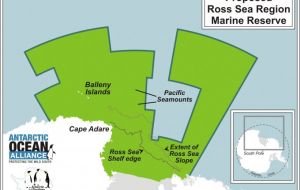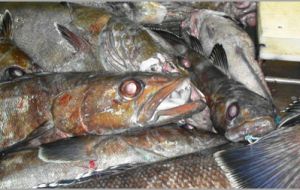MercoPress. South Atlantic News Agency
AOA calls on CCAMLR to agree on marine protection of the Ross Sea and East Antarctica
 A joint US-NZ proposal to designate a Ross Sea marine protected area (MPA) of 1.32 million km2 (with 1.25 million km2 as “no take”) is under consideration
A joint US-NZ proposal to designate a Ross Sea marine protected area (MPA) of 1.32 million km2 (with 1.25 million km2 as “no take”) is under consideration  The Southern Ocean is home to more than 10,000 unique species including most of the world’s penguins, whales, seabirds, colossal squid and Antarctic toothfish.
The Southern Ocean is home to more than 10,000 unique species including most of the world’s penguins, whales, seabirds, colossal squid and Antarctic toothfish. As representatives of the 25 Members of the Commission for the Conservation of Antarctic Marine Living Resources (CCAMLR) meet this week in Hobart, where they will decide the fate of two key protection proposals in the Ross Sea and East Antarctica, the Antarctic Ocean Alliance (AOA) (*) called on the member countries to honor their conservation commitments and finally agree to lasting and significant Southern Ocean protection.
A joint US-NZ proposal to designate a Ross Sea marine protected area (MPA) of 1.32 million km2 (with 1.25 million km2 area proposed as “no take”) is under consideration. The Ross Sea, is often referred to as “The Last Ocean” due to its status as one of the most pristine oceans remaining on earth.
Australia, France and the EU are once again proposing an MPA to protect 1.2 million km2 of East Antarctic waters. Their proposal would allow for exploratory and research activities within the MPA if they are consistent with the maintenance of the MPA's objectives.
Both MPA proposals have undergone a number of iterations, and several compromises have been made. The international NGO members of AOA recommend immediate designation of both proposals rather than risk further erosion.
“During the past three CCAMLR meetings, we have hoped for action on marine protection in Antarctica’s waters, protection that CCAMLR promised to put in place by 2012. Instead we have seen three years of inaction,” said Mark Epstein, Executive Director of the Antarctic and Southern Ocean Coalition.
“While this meeting provides another opportunity for global leaders to live up to their overdue commitments, the time is now for action on marine protection.”
“If CCAMLR truly wishes to protect the biodiversity of the Southern Ocean, it cannot wait any longer,” said Andrea Kavanagh, who directs The Pew Charitable Trusts’ efforts to protect penguins and the Southern Ocean.
“At the height of the Cold War, the international community came together to protect the Antarctic, when no one thought it possible. CCAMLR has an opportunity to repeat this success, by making good on its commitment to protect Antarctica’s ocean, and rising above the geopolitical jousting that is stalling the creation of real, meaningful marine protections in the Ross Sea and East Antarctica.”
The Southern Ocean is home to more than 10,000 unique species including most of the world’s penguins, whales, seabirds, colossal squid and the commercially targeted Antarctic toothfish.
The Antarctic Ocean Alliance is delivering to CCAMLR 33 delegates a recent report highlighting a small sample of the thousands of resilient species that call the pristine Southern Ocean home.
The new report, “33 Species We Love and Must Protect” serves as a symbolic reminder that in order to continue research and discovery in Antarctica and protect many vulnerable and unique species, there must be commitment to preservation through enhanced protection.
“Antarctica is one of the world’s last untouched wildernesses and is critical for scientific research, both for studying how intact marine ecosystems function and for monitoring the impacts of climate change,” said Bob Zuur, manager of WWF’s Antarctica program.
“A network of large-scale, permanent marine protected areas in the Ross Sea and East Antarctica would build on the spirit of political cooperation in the Antarctic Treaty and create a lasting legacy for future generations.”
“MPAs and fully-protected marine reserves are the single most powerful tool that CCAMLR has for fulfilling its mandate and protecting the astounding array of Antarctica’s marine life and enabling the Southern Ocean ecosystem to best withstand the impacts of climate change and ocean acidification,” added Richard Page, Greenpeace Oceans Campaigner.
The Commission, the consensus-based body made up of 24 countries and the European Union, will have another opportunity to create two large-scale Southern Ocean MPAs as they again convene in Hobart, Tasmania. The proposals up for discussion would establish reserves in the waters of the Ross Sea and East Antarctica and if agreed upon, would create some of the world’s largest MPAs.
The Antarctic Ocean Alliance partners will attend the CCAMLR meeting in Hobart, working to ensure CCAMLR delegates step up to the challenge and designate the Ross Sea and East Antarctica proposals.
(*) The Antarctic Ocean Alliance is a coalition of high-profile individuals and some 30 leading environmental groups. These include The Pew Charitable Trusts, Greenpeace, WWF, Humane Society International, the Antarctic and Southern Ocean Coalition (ASOC), The Blue Marine Foundation (UK), Mission Blue (US), Oceans 5 (US), Deep Wave (Germany), Whale and Dolphin Conservation (Germany), The Last Ocean, the Korean Federation for Environmental Movement (KFEM), Greenovation Hub (China), Forest & Bird (NZ), ECO (NZ), Friends of the Earth Japan and associate partners the Natural Resources Defense Council (NRDC), Oceana, the International Fund for Animal Welfare (IFAW) and Ocean Planet (Australia).




Top Comments
Disclaimer & comment rules-

-

-

Read all commentsIs Argentina contributing to this?
Oct 20th, 2014 - 11:11 pm 0No doubt her emissary paulcedron ( will tell us..lol
Oct 20th, 2014 - 11:30 pm 0Haha!
Oct 21st, 2014 - 12:21 am 0Or Enrique will arise from his cosy slumber in Canada?
Commenting for this story is now closed.
If you have a Facebook account, become a fan and comment on our Facebook Page!